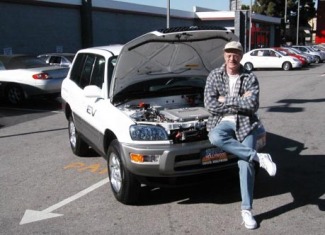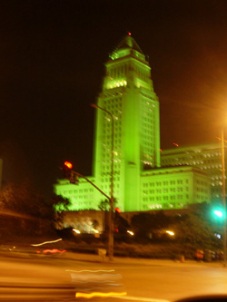Last week, LA Times media columnist Tim Rutten instructed the LA news media that the only real issue in Mayor Villaraigosa’s extramarital affair was “the fact that (girlfriend Mirthala) Salinas continued to report on the mayor while they were involved in this fashion….”
Since that column, the Times’ reporters have dutifully focused on that aspect, writing the ultimate “who cares?” story today:
Mirthala Salinas was a rising star at one of Los Angeles’ premier Spanish-language television stations before she came to be known as the other woman in Mayor Antonio Villaraigosa’s life.
A respected and aggressive journalist, she anchored a newscast that won two local Emmy Awards at KVEA-TV Channel 52 during her 10 years at the Telemundo station. She earned a Golden Mike broadcasting award as well.
“She was very smart and always had her finger on the pulse of the community,” said one former Telemundo executive, who recalled the 35-year-old newscaster as poised and articulate.
(Where was her finger again?)
Now, Salinas’ career hangs in the balance as Telemundo executives decide as early as Monday whether to fire her for having a romantic relationship with Villaraigosa while she was covering him as a political reporter.
The City Hall beat’s course thusly corrected, Rutten has moved on to Harry Potter, specifically the controversy over two book reviewers — the NY Times‘ Michiko Kakutani, the Baltimore Sun’s Mary Carole McCauley — publishing reviews in advance of the release of the final novel in the series early this morning. There was an agreement of some kind with media getting advance copies that they would not do this.
Rutten wants us all to know that, from his Olympian perch, he sees nothing wrong with what the reviewers did.
Usually, what the public trusts a newspaper to do is to tell things, not withhold information, but maybe those rules don’t apply to “the boy who lived” any more than the laws of nature do.
(snip)
(Author J.K. Rowling) told the British press that she was “staggered that some American newspapers have decided to publish purported spoilers in the form of reviews in complete disregard of the wishes of literally millions of readers, particularly children, who wanted to reach Harry’s final destination by themselves, in their own time. I am incredibly grateful to all those newspapers, booksellers and others who have chosen not to attempt to spoil Harry’s last adventure for fans.”
Fair enough. She’s the author, and she’s entitled. The fact of the matter is, though, that both Kakutani and the Sun’s Mary Carole McCauley are accomplished critics whose reviews scrupulously avoided giving away anything that could be considered a plot spoiler. Even the most passionate Potterites could read their pieces without fear of compromising their pleasure in this new book.
Really? How does Rutten know this? Both reviews made it pretty clear that, to answer one big question in fans’ minds, Harry does not die. You had to read between the lines, but the tone and carefully chosen words in both reviews could only lead you to one conclusion.
From the Sun:
So, while we really can’t divulge the ending of Book 7, we can tell you this much:
As the series draws to a close, Rowling gives her favorite character a rare and precious gift, a treasure that outshines any other boon she can imagine — including immortality.
She gives Harry a family.
The Times’ Kakutani is more circumspect about the ending, but her descriptions of the novel tell readers what to expect along the way to it:
No wonder then that Harry often seems overwhelmed with disillusionment and doubt in the final installment of this seven-volume bildungsroman. He continues to struggle to control his temper, and as he and Ron and Hermione search for the missing Horcruxes (secret magical objects in which Voldemort has stashed parts of his soul, objects that Harry must destroy if he hopes to kill the evil lord), he literally enters a dark wood, in which he must do battle not only with the Death Eaters, but also with the temptations of hubris and despair.
Rutten wants us to know that Rowling — who, he emphasizes, has become a billionaire from her writings — isn’t really concerned, as she says, about “children, who wanted to reach Harry’s final destination by themselves, in their own time.” Nope. Rutten has deduced that “it’s about money.” After acknowledging there are bad guys — on the Internet! — who posted PDFs of the book, he goes on to make an obvious but pointless distinction.
Embargoes on reviews and discussions are another matter. All the outrage surrounding this particular book notwithstanding, contemporary publishers impose these blackouts not in the interest of readers but to protect the carefully planned publicity campaigns they create for books on which they have advanced large sums of money.
This is the economic imperative that leads publishers to withhold the contents of even nonfiction manuscripts that contain news that the public has a vital interest in knowing.
It’s also why newspapers, including this one, routinely break those embargoes without any pang of conscience. Our first and most compelling obligation is to our readers’ right to know and not to the commercial interests of publishers.
That’s right, everybody. It takes guts for journalists to ferret out the news from…uh, their own desks. You, my readers, have a right to know plot points in a work of fiction that was sent to me by the publisher. It’s my solemn duty to report this information, even though I agreed not to.
What Rutten is alluding to are the embargoes of non-fiction books written by journalists on the payroll of a newspaper, where legitimate news is squirreled away for maximum commercial impact, to the detriment of the public’s interest. The Washington Post, in particular, is famous for doing this, keeping accounts of secret White House deliberations under wraps so as not to spoil a book launch.
How is the Harry Potter series anything like that? Rutten is being excruciatingly literal here. But he also fails to support his case. How is money implicated? Spoiling the surprises wouldn’t have stopped readers from buying “Harry Potter and the Deathly Hallows.” As Rutten himself reports, some 1.8 million readers had already advance-ordered it from Amazon alone.
No; the only result of spoiling the surprises is spoiling the surprises.
Rowling is an artist of suspense. She knows what she wants readers to experience and when. But because Tim Rutten doesn’t get that, he’s let the word go forth that journalists have a right, nay a duty, to break embargoes for works of fiction. Just as he has ruled that Mayor Villaraigosa’s private life is none of our business, unless it creates a conflict of interest for a member of the sacred class of journalists.
Okay, Rutten, so what about this: What if an elected official was married to a novelist, and the novelist told the elected official the ending to his or her next book, not knowing that the elected official was also sleeping with a reporter? Would it be appropriate for the reporter to review the novel?

